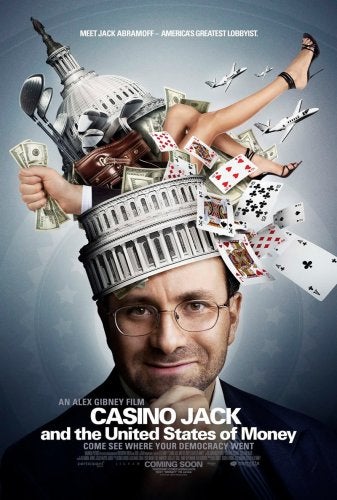The hard part of any documentary, but particularly this one, is to tell the story from the inside out.
For a long time “Casino Jack and the United States of Money” was structured as a detective story, but the only people we could follow were the detectives — that is to say, the print reporters who had gone before me.
But the longer we hung in there, the more stuff we found. You just keep digging, digging, digging, and that’s what you get.
 We spent long enough with some of the tribes that they gave us audiotapes they had of Jack Abramoff coming out to pitch them.
We spent long enough with some of the tribes that they gave us audiotapes they had of Jack Abramoff coming out to pitch them.
Everybody talks about Jack Abramoff the great pitch man, but it’s another thing to hear him selling the tribes.
We actually found, in London, one of the cameramen who had been to that famous Jamba Jamboree in Angola, where Abramoff and Grover Norquist were shooting machine guns in the air with Jonas Savimbi; he had 10 hours of footage from that.
We found a photographer in Washington, D.C., who had been hired to take photographs at all of these Jack Abramoff events, and lo and behold, while everyone was denying that they had ever spent time with Jack Abramoff, suddenly we had all this photographic evidence.
And although it’s not one of the more shocking things about the Abramoff story, one of those upending moments in the film is when you have Sen. Ben Nighthorse Campbell very righteously pointing the finger at Mike Scanlon and Jack Abramoff as being the bad guys who have destroyed the Indian community.
And then we have the photographs which show Ben Nighthorse Campbell with Jack Abramoff, and we know for a fact that Abramoff gave him a lot of money, too.
You have these two mute guys, Jack Abramoff and Mike Scanlon, sitting there as these guys are prattling on, but if they had been able to speak, they would have said, “Oh, well, what about that time we gave you $20,000, Senator?”
So that was interesting.
We waited long enough that we got Bob Ney and Adam Kidan, who had spent a lot of time in prison, who could comment very much from the inside about Jack and also, in Bob Ney’s case, the way the political system works, the system of favors.
And we went to the Marianas. It’s a funny thing, when you go to a small place like that, you’ll never get anything by calling somebody on the phone there. But you can go out there for a couple weeks and you just hang out, and the next thing you know you go down the street and you talk to these guys who effectively were bought off into changing their votes so that Jack Abramoff could keep his contract.
You get a flavor of how it works. You find archive that you normally wouldn’t get. So it takes time and it takes some digging, but you get the stuff.
Sometimes people volunteer to send you stuff — not enough! Usually you have to do the work. It’s a lot of shoe-leather work, much of it done by the very talented researchers in my office. But sometimes you call up this person who puts you on to this person who puts you on to this person, and you have to sweet-talk them and persuade them.
It’s also tricky, in the case of Abramoff, where there’s still an ongoing federal investigation. People are lawyered up; they’re concerned — they don’t want to go above-ground.
In order to get inside some of these stories, we had to wait things out until sources came forward, materials came forward. You can just put yourself on a schedule and crank it out, but at the end of the day you hope to make films like this that have an impact in the here and now.
But also when you’re making films like these, you hope that they’re not just about current events. If they are, then you just might as well be making them for TV. I think you’re hoping they stand the test of time and that they’re bigger than just about a particular moment in time.
Our democracy is being bought and sold by the people who have the money to do so. I think it is our biggest problem right now. “Casino Jack” couldn’t more effectively show that.
We’re supposed to be a representative democracy, but if a few people are making a lot of money from, in effect, insider trading, and they pay off the people who are regulating them to stand by while they continue to pull up the Brink’s truck to the bank, there goes our savings – there goes everything. and that’s not really a representative democracy anymore.
That’s why I called it “Casino Jack and the United States of Money.” It’s supposed to be the United States of America, but now it’s really about the money.
I just hope that we get angry enough. The recent display in Congress, with Goldman Sachs, is a start.
But at the end of the day, the real proof will be to see whether or not meaningful financial reform is passed.
There are things we can do to take the money out of the system, but we’re going to have to work pretty hard at it.